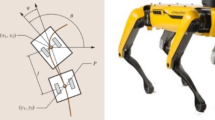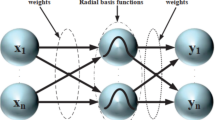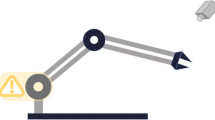Abstract
Neural network control for robot manipulators is aimed to compensate for uncertainties in the robot dynamics. The location of a compensating point differentiates the control scheme into two categories, the feedback error learning (FEL) scheme and the reference compensation technique (RCT). The RCT scheme is relatively less used although it has several structural advantages. In this paper, the global stability of the RCT scheme is analyzed on the basis of Lyapunov function. The analysis turns out that the stability depends upon the magnitude of the controller gains. Simulation studies of controlling the position of a two-link robot manipulator are conducted.
Similar content being viewed by others
References
H. Gomi and M. Kawato, “Learning control for a closed loop system using feedback error learning,” Proc. of the IEEE International Conf. on Decision and Control, pp. 3289–3294, 1990.
X. Xie, L. Cheng, Z. Hou, and C. Ji, “Adaptive neural network control of a 5 DOF robot manipulator,” Proc. of Int. Conf. on Intelligent Control and Information Processing, pp. 376–381, 2010.
Y. Wu, Q. He, and C. Wang, “Adaptive neural learning control of rigid-link electrically-driven robot manipulators,” Proceedings of the 30th Chinese Control Conference, pp. 6616–6622, 2011.
D. Zhao, Q. Zhu, N. Li, and S. Li, “Neural network based synchronized control for multiple robotic manipulators,” Proc. of IEEE Conf. on Control and Automation, pp. 1950–1955, 2013.
R. J. Wai and R. Muthusamy, “Fuzzy-neural network inherited sliding-mode control for robot manipulator including actuator dynamics,” IEEE Trans. on Neural Network and Learning Systems, vol. 24, no. 2, pp. 274–287, 2013.
R. J. Wai and R. Muthusamy, “Design of fuzzy-neuralnetwork-inherited backstepping control for robot manipulator including actuator dynamics,” IEEE Trans. on Fuzzy Systems, vol. 22, no. 4, pp. 709–722, 2014.
F. L. Lewis, S. Jagannathan, and A Yesildirek, Neural Network Control of Robot Manipulators and Nonlinear Systems, Taylor & Francis, 1999.
S. Jung and T. C. Hsia, “Neural network inverse control techniques for PD controlled robot manipulator,” Robotica, vol. 19, no. 3, pp. 305–314, 2000.
S. Jung and H. T. Cho, “Decoupled neural network reference compensation technique for a PD controlled two degrees of freedom inverted pendulum,” International Journal of Control, Automation, and Systems Engineering, vol. 2, no. 1, pp. 92–99, 2004.
S. S. Ge and C. Wang, “Direct adaptive NN control of a class of nonlinear systems,” IEEE Trans. on Neural Networks, vol. 13, no. 1, pp. 214–221, 2002.
Author information
Authors and Affiliations
Corresponding author
Additional information
Recommended by Associate Editor Xiaojie Su under the direction of Editor Fuchun Sun. This work has been supported in part by the 2014 National Research Foundation of Korea (NRF-2014R1A2A1A11049503).
Rights and permissions
About this article
Cite this article
Jung, S. Stability analysis of reference compensation technique for controlling robot manipulators by neural network. Int. J. Control Autom. Syst. 15, 952–958 (2017). https://doi.org/10.1007/s12555-015-0070-7
Received:
Revised:
Accepted:
Published:
Issue Date:
DOI: https://doi.org/10.1007/s12555-015-0070-7




